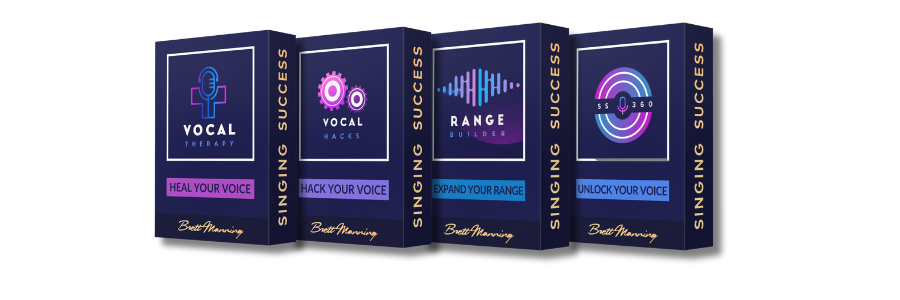How to Come Up with a Stage Name for Singing Success
So you’re thinking about coming up with a stage name that defines your desired artist persona. Maybe it’s necessary because your real name has already been made famous by somebody else. Or perhaps your birth name is too close to the name of a popular singer, or actor, or maybe it bears a striking similarity to the name of a notorious criminal or politician.
Whether you’ve never thought of using a stage name or already have what you think is a good stage name, consider some of these creative thoughts and
stage name ideas. It could make all the difference in the world.
Fast-Track Your Success!!

VIP Membership includes:
- Exclusive Facebook Group
- Interact with our vocal coaches–ask them YOUR question
- Live warmups
- Masterclasses and Q&As with Brett Manning and his guests
- SS360 QuickStart Program
- SS360 – The FULL Systematic Vocal Course
- Vocal Hacks
- Range Builder
- Mastering Mix
- Mastering Harmony
- Mastering Vibrato
- Vocal Therapy
- Plus…exclusive content only found here all along the way!
You can struggle on your own, or you can get direct access to the Nashville Coaches who have launched some of the biggest names in the music industry.
What’s in a Stage Name?
Stage names can evoke associations with certain genres, feelings, and attitudes. They can even pay homage to other artists. Ultimately, a stage name is an identity and a marketing tool… and you don’t need a massive marketing budget to create a great one.
Using a stage name can be of great importance because it can create a wholly separate identity for you. Think of Eminem’s alter ego, Slim Shady. He once said, “Everybody’s got two sides to them. Slim Shady’s just an angry side for me to vent.”
However, its purpose can also be as simple as creating a more memorable name that can stick in someone’s head. Undoubtedly, Snoop Dogg is a name that isn’t easily forgotten.
Good stage names also have the ability to help you define the type of performer you are or want to become. Your name even gives your audience an idea of what they can expect out of you as an artist.
A tough challenge is to create a stage name that helps future and existing fans track your music easily. This is the most important part of building a fanbase, releasing music, and launching your music career.
Actual Names Aren’t Always Best
Bob Dylan (born Robert Zimmerman), Lady Gaga (born Stefani Joanne Angelina Germanotta), and Elton John (born Reginald Kenneth Dwight) are all examples of famous artists who use stage names. As you can tell by the complexity of their actual name, unique stage names are easier to remember and help to avoid confusion.
The Best Stage Names for Marketing and the Music Industry

In this day and age, memorability and search engine performance are key. People have to remember your name (at least somewhat) and use some type of search engine to find you. Additionally, protecting your identity when it comes to social media is also important, so that may limit you, depending on your approach.
In the music industry, you have to think about how your stage name will work in conjunction with social media profile names and website domains. Thinking about this will take a little research, but it is an essential factor when choosing a stage name for the music industry.
Brainstorming Can Be Fun
Whatever your reason for considering a name shift, coming up with a stage name can be both frustrating and annoying. But there are some ways to have a little fun as you explore the possibilities.
Your Birth Name
Your own name could become your stage name. One popular way to do this is by using a mononym (a single word), such as Beyoncé (Beyoncé Giselle Knowles) or Cher (Cherilyn Sarkisian). Try experimenting with using a shortened version of your real name, changing the spelling of your name, or using a combination of your birth name and middle name.
Most singers will only use a mononym if they really like their given name and want to become and live their identity in the music industry.
Significant Others
Let’s say you want to change your last name. Maybe you want the name to have some personal significance so that it’s something you feel connected to. One place to begin your search might be your family history. You might adopt your favorite aunt’s or mother’s maiden name as your last name.
Perhaps there was a nickname you were called when you were younger that you can play around with as a possible last name. Although oftentimes nicknames are something we want to forget and not promote.
Places + Spaces
Another source of inspiration could be to look at your hometown and places where you’ve lived or your favorite places to visit or vacation. The names of the towns and cities, streets and counties, rivers and neighborhoods might be the perfect fit for the last name of your stage persona or the full name of a band you’re putting together.
Maybe you could do like A-list pop singer Halsey, who got her name from a street in Brooklyn where her former boyfriend lived.

Personal Heroes
You can compile a list of your personal heroes. This list can include teachers, coaches, Brett Manning ;), doctors, hometown heroes, pastors, community leaders, and so on. Then the name becomes part of a tribute to those that have helped you find your voice and the courage to share it.
History + Heart
These are good starting points for finding that new stage name. These options give you a personal connection that offers a sense of history and a place in your heart. These same searches apply to finding a first and middle name if the personal connection or special meaning or significance is critical.
Fans like a good story. For example, using a childhood nickname, your mother’s maiden name, or even an alternative but real name is a good way to build a history around your music stage name, and it makes a great story for your potential fans and invites them to engage.
There’s nothing like being able to communicate the love you have for your family, friends, and community when someone asks you the simple question, “Where did you get your name?”
Feel The Theme
You can start by identifying a feel, concept, or theme you want the stage name to suggest. Then, come up with names of celebrities, fictional characters, historical figures, etc. that suggest and define those elements.
Then, you can mix these names up by pulling the first name of one and grabbing the last name of another to create the new stage name that fits the feel you’re after. You can then add variations of the new name and create several possibilities of stage names.
Fifty – Fifty
Here’s a simple, off-the-wall, approach you can play with. Think of 50 first names you like and 50 last names you find intriguing. Then, assign each a number. Pull the numbers out of a hat. Keep going until something clicks or until that one combination triggers the name of your superstar persona!
This approach can also be used for helping you come up with a band name. Imagine your alternative folk rock trio being named for your grandmother and a favorite cartoon character.
Genre Driven
In addition, many bands select names that reflect the music they play. You can think in terms of dreams, goals, struggles, and triumphs that are expressed by the music you perform. Put together a list of descriptive terms that stand for the feel of your music.
This helps connect your fans to your music and your music to your fans. That’s what it’s all about!
Demographic Driven
Compile a list of professions that represent the class of people that you mostly sing about and that you feel closely reflect the greatest potential for your fan base. This is your target audience.
It’s important to know your audience and the music genre you intend to represent. Make sure you research successful artists of your genre to know what kind of artist name will work best for you. For example, you don’t want a name that identifies more with hip-hop if you’re singing country.
Mix + Match
Mix and match pairs of descriptive words with a profession until something fits. Then, tack the number of members in your band. For example, let’s say you liked the descriptive word: hungry and chose the profession or occupation to be: homemaker. If there are four of you, the working name for the band becomes Four Hungry Homemakers.
Catch Phrases
You could also choose your favorite catchphrases and then pull bits from two or three to make up a phrase that sounds catchy but mysterious or strange or irreverent or even utter nonsense.
Twists + Spins
A popular or common idea for choosing a band name or stage name includes using misspellings of common words and names. You can mix letters and numbers and symbols. You can even make up words by combining or twisting existing words.
For example, let’s say you need a name for your jazz trio. You’re intrigued by the words: thumbprints and heart attacks. Your trio might be called: Three Heart Prints or When Thumbs Attack.
Keep in mind that adding misspellings and characters might limit search engines when your artist name doesn’t match what people type by memory.
Word Play
Play with alliteration – the same consonants, such as Three Times Trying or Big Bad Boo. Use the first initials of each band member, followed by the express or station or boulevard. The key is to keep playing until something sticks, and you can’t shake it because you don’t want to (and your friends and family don’t want you to either.)
These time-scribbling approaches may not yield the name you ultimately go with, but they may trigger some songwriting or name ideas. It can be used as a rehearsal exercise or a fun way to just brainstorm or chill. There is no wrong way to choose a good stage name.
In fact, you might name your band or choose your celebrity stage name as your avenue of pursuit for Singing Success. (Do you see what I did there?)
An Artist by Any Other Name, Just Isn’t the Same (Name).
One audience test that most people do not consider is figuring out what your stage name means in other languages and other cultures. Some stage names (and small variations of them) don’t always translate well.
Another good rule of thumb is to test any name you choose with friends and family. You don’t need to ask a crew of casting directors for their advice, but it would be nice to get some good and honest feedback.

Chosen Stage Name
The best-chosen stage name for you will be thoughtful and considerate, and hopefully help promote a unique brand and image. It can also help to enhance an engaging stage presence. It should also be a name that resonates with you and makes you feel like the music performer and artist that you are.
The Verdict (or Maybe the Exoneration)
Good music, a good voice, and killer chops on your preferred instrument may be enough to become as popular as Taylor Swift, but having an amazing and unique stage name will never hurt!
Some independent artists have had to use their given name because they were discovered before they had the chance to create an alternative professional name. Oh well!
But, when it’s all said and done, you have to live with this artist name, so live and love the stage name you choose!
If none of these ideas work, be completely lame and non-creative and use one of those cheesy artist name generators to create your alternative identity…. I’m just kidding! I believe if you can create great hooks, you can create a great stage name!






